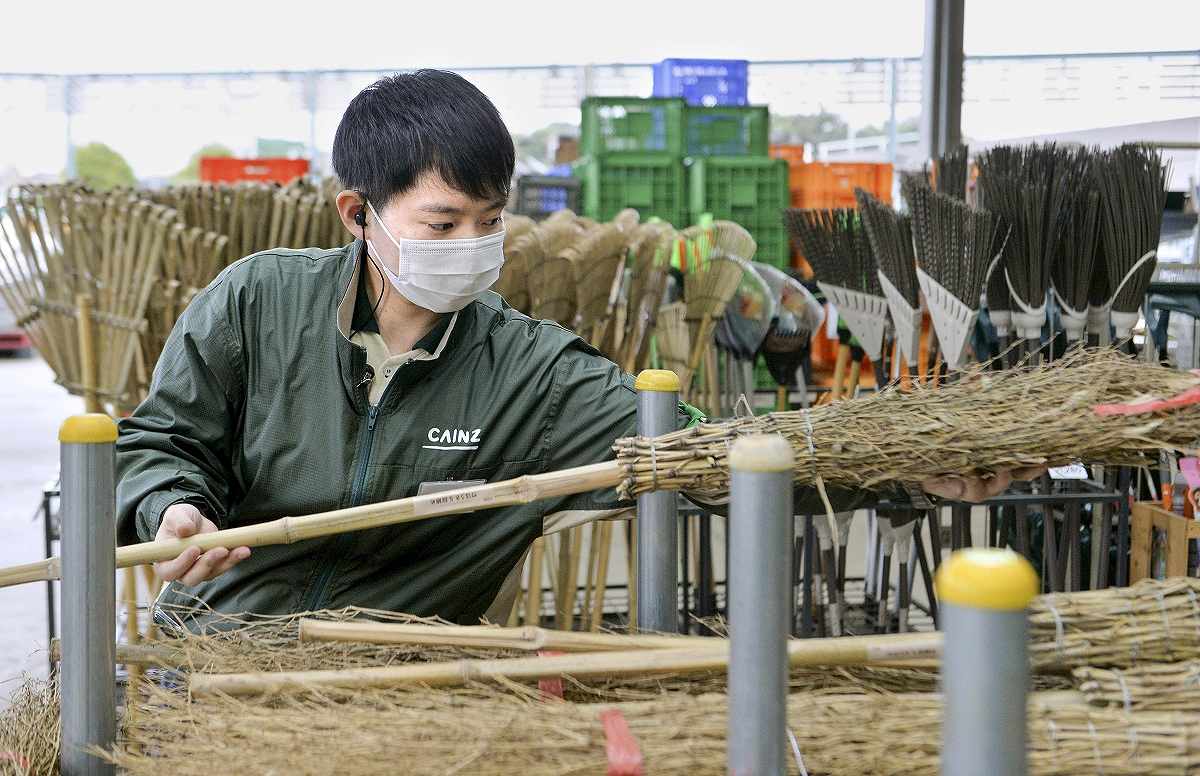
A man whose post-graduation job offer at a hotel was rescinded due to the coronavirus works at a Cainz store in Saitama Prefecture on Nov. 6.
11:47 JST, November 29, 2020
Companies in regional areas across Japan are enthusiastic about securing human resources amid the change in the employment picture triggered by the coronavirus pandemic.
A hiring spree has become noticeable in conjunction with an “escape from the city” movement brought on by the spread of the virus, with one expert pointing out, “This is a chance to rectify the concentration of people in major cities.”
First in 20 years
“We can now pull in some young talent, can’t we?” said Muneki Matsumoto, 40, president of Tosa Brewing Co. in the town of Tosa, Kochi Prefecture.
Matsumoto was speaking in late August by telephone with Hiroyuki Yoshii, coordinator at the prefecture’s relocation and employment promotion center, whom he had called to consult about employment.
Tosa Brewing was established in 1877 and has 20 employees. The long-established brewery, known for its flagship sake brand Keigetsu, has won prizes in overseas competitions. The company has job openings throughout the year, but only receives one or two applicants, and has found it especially difficult to recruit new graduates.
Yoshii told Matsumoto that an increasing number of people in their 20s and 30s have contacted the center for advice, saying they have decided to move. Hearing that, Matsumoto realized that the coronavirus crisis has created a favorable employment environment for regional areas.
Soon after, Tosa Brewing hired five men and women, ranging in age from their 20s to 60s, from both inside and out of Kochi Prefecture. One had even been a research lab director at a leading pharmaceutical company.
Another was a 21-year-old female student from Hiroshima Prefecture who studied soil analysis at a university in the Shikoku region. She is the first new graduate hired by the brewery in more than 20 years. She had received a job offer from a leading railway company, but turned it down.
She said she had taken all her employment tests online, and was interviewed face to face at the railway company for the first time only after receiving a formal offer.
“I felt incompatible with the corporate culture,” she said. “It is a major company, but I could be transferred anywhere in the nation and have to work irregular shifts.”
Tosa Brewery plans to set up a research lab for the woman.
“With the battle for recruiting workers easing up at the moment, we want to invest in the future by hiring people with talent that we have never had before,” Matsumoto said.
According to the Internal Affairs and Communications Ministry, the number of people who moved out of Tokyo exceeded that of those moving in for four consecutive months from July to October as an effect of the coronavirus pandemic. The same situation was seen in the Osaka metropolitan area for three consecutive months. Amid this trend, local governments in areas with falling populations are also stepping up efforts to secure human resources.
The Tokushima prefectural government hired seven people who had lost their jobs amid the pandemic as staff appointed for this fiscal year, and will help them find new jobs in the prefecture during their period of employment.
The prefectural government hopes to hire up to 20 people, with an official in charge saying, “We want to attract people who, spurred by the coronavirus crisis, either were born here and are coming back, or want to newly move to Tokushima.”
Meiji University Associate Prof. Yasuyuki Iida, who specializes in economic policy, said the pandemic presented an opportunity for alleviating the concentration of people in Tokyo.
“There are few job openings in rural areas in which career women can fully utilize their abilities, and it is important to create a job environment where men and women can work together as equals,” Iida said. “It is also necessary to establish a system to provide job counseling for spouses who were both working in cities.”
Offering 3,000 jobs
Leading home center chain Cainz is among a number of companies stepping up to help those who lost their jobs or had job offers canceled due to the coronavirus crisis.
The company, based in Honjo, Saitama Prefecture, plans to hire 3,000 new workers at its 225 stores nationwide. About 50% of the jobs have already been filled, and applicants seeking to be hired as full-time staff in mid-career have more than tripled from the previous year. The number of new hires is about 2.5 times higher.
One new male employee in his 20s, who started working at a store in Saitama Prefecture in July, had a formal offer from a leading hotel to start upon graduation from college. But the hotel rescinded the offer in April.
At a loss over his inability to find a job, he learned about Cainz’s recruitment drive. “I can become involved in dealing with customers and helping them build things, both of which I like,” he thought. “And I can drive to work, so I can avoid crowded settings, too.”
He applied and was hired as a full-time employee.
“When I was a student, I didn’t take work seriously,” he said. “But now, I feel gratitude that I have been given the chance to work.”
Cainz, aiming to boost its customer services, plans to drastically increase its workforce with both part-time to full-time employees over the next fiscal year.
“We want to contribute to society by creating jobs in local communities,” a person from human resources said.
Top Articles in Business
-

Prudential Life Insurance Plans to Fully Compensate for Damages Caused by Fraudulent Actions Without Waiting for Third-Party Committee Review
-

Narita Airport, Startup in Japan Demonstrate Machine to Compress Clothes for Tourists to Prevent People from Abandoning Suitcases
-

Asics Opens Factory for Onitsuka Tiger Brand in Western Japan
-

JR Tokai, Shizuoka Pref. Agree on Water Resources for Maglev Train Construction
-

KDDI Opens AI Data Center at Former Sharp Plant in Osaka Prefecture; Facility Will Provide Google’s Gemini AI Model for Domestic Users
JN ACCESS RANKING
-

Japan Institute to Use Domestic Commercial Optical Lattice Clock to Set Japan Standard Time
-

Israeli Ambassador to Japan Speaks about Japan’s Role in the Reconstruction of Gaza
-

Man Infected with Measles May Have Come in Contact with Many People in Tokyo, Went to Store, Restaurant Around When Symptoms Emerged
-

China Eyes Rare Earth Foothold in Malaysia to Maintain Dominance, Counter Japan, U.S.
-

Prudential Life Insurance Plans to Fully Compensate for Damages Caused by Fraudulent Actions Without Waiting for Third-Party Committee Review
























